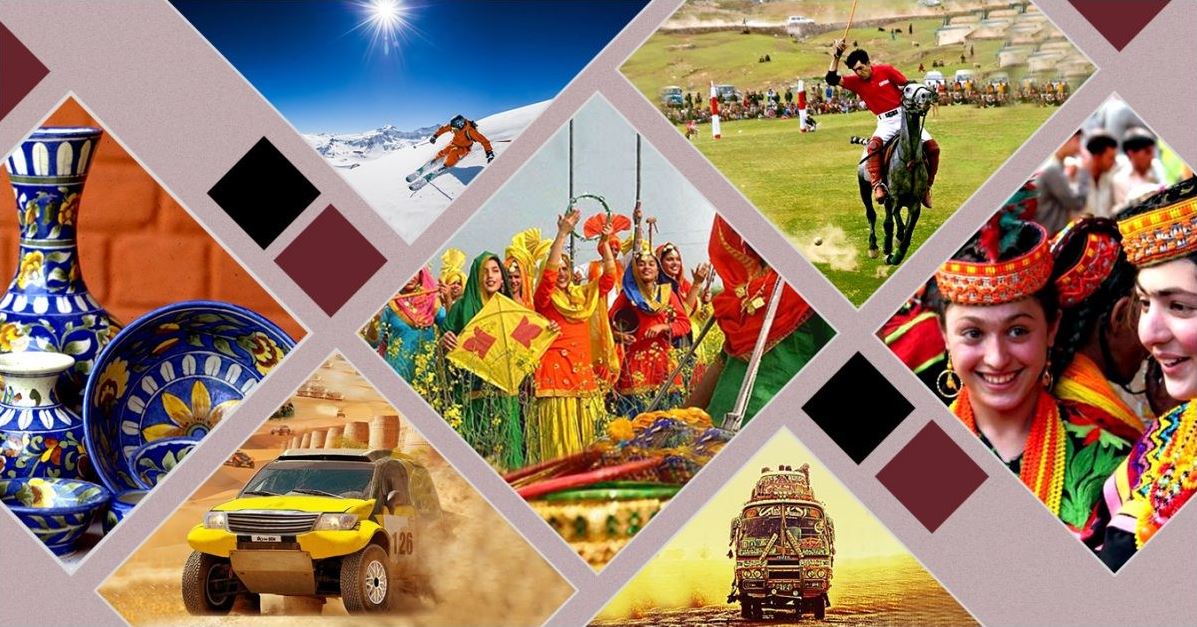As Johan Huizinga, a Dutch historian put it, “If we are to preserve culture, we must continue to create it”. One universal truth about the nature of cultures is that they are never static. We have all seen it –it’s something that we know from our own lives and our own observations.
Pakistan is no exception as it is part of a region that has been at the confluence of civilizations. Through the shifting sands of time, empires have ruled and perished, and their cultures and traditions have molded the modern state of Pakistan. Thanks to its historical and geographical ethnic diversity,
Pakistan’s culture is a melting pot of Indian, Persian, Afghan, Central Asian, South Asian and Western influences. There are over 15 major ethnic groups in Pakistan which differ in physical features, historical bloodlines, customs, language, dressing, food and music.
Other than the ancient ethnic elements, the religious influence of Islam had also shaped Pakistani culture since it first came to the region in 700 AD and then again flourished during the Mughal period under the auspices of Sufi saints who migrated from all over the Islamic world. Nevertheless, the Pakistani society continues to evolve and with increasing globalization it has not been immune to influences of other cultures.
Having covered the history and origin of Pakistani culture, let’s move towards what it consists of. Pakistan has a collectivist culture in the sense that people are deeply interdependent and loyal to those who are within their inner circle. The culture has a significant number of features that differentiate it from other cultures namely, religious uniformity, language, literature and poetry, dress
and diet, biryani being a significant part of it, arts and architecture, handicrafts etc.
Moving forward, let’s talk about how Pakistani culture has really changed over the years. Statisticss how that the main cultural change seen in Pakistan is westernization. What is westernization? Westernization is when countries in other parts of the world start to adopt the practices and culture of Western Europe whether through compulsion or influence.
Pakistan was and is still exposed to the political and economic philosophies, social structures, languages, and styles of education of Europe and the Americas, and one of the main causes of this exposure and influence is social media.
Furthermore, Pakistani culture has not been studied and documented properly, hence this can, rather is, another reason why the true culture of Pakistan isn’t implemented upon and the fact that the people of Pakistan primarily follow western culture, whether it comes to food, clothes, language etc.
However, the change of culture is not just limited to Pakistan. But it is a global phenomenon. Internationally culture is also changing. Through cultural globalisation, the world becomes morecosmopolitan, and cultures and societies begin to experience a broader and freer interchange of ideas and values.
Tourists, as well as businessmen travelling from one country to another, bring their own particular set of ideas and beliefs that can influence another culture over time. Other factors that contribute to cultural globalization includes various means of communication, such as social media, especially Western celebrities who reach an audience of millions around the world with their opinions on fashion or pictures of what the latest style of clothing is.
Now how do we overcome this dilemma of us slowly drifting away from our cultures, well surprisingly enough, the answer lies within our own grip. We fix this by using the very tools that fuel this drift to pull our selves back once again to our roots. As cliché as it sounds, awareness is one of the strongest
tools to have. By spreading awareness regarding cultural identity through social media we are countering its negative effects. We are using a modern tool that is cheap, efficient and accessible to all. It is only through cultural revival that we can once again revive and retain that very history that connects us through interest and differentiates us through our uniqueness.
Let’s all work towards creating a more culturally diverse world, where we still eat sushi just as enthusiastically as today, but we don’t forget that delicious plate of biryani either.
Contributed by: Team Cultural Revival
Leena Marriam Badar, Raheen Kashif, Noor-ul-Huda Zaman & Sarah Faisal

